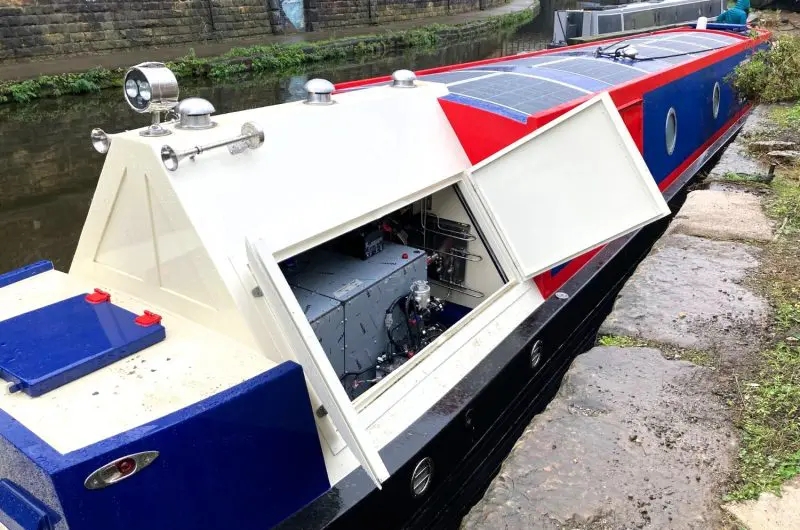Bramble Energy in the UK has launched the world’s first hydrogen-electric boat powered by a printed circuit board fuel cell (PCBFC). Next step is developing the PCBFC systems for wider maritime applications.
As the lead partner in the HyTime project working alongside custom engine builder Barrus, Bramble Energy has created a demonstration vessel that showcases the vast potential of its PCBFC technology to quickly and cost-effectively decarbonise the marine sector.
Also read: Windcat orders more hydrogen-powered CSOVs from Damen
600 miles of range
In a maritime first, a 57ft narrowboat was launched onto the water in Sheffield, Yorkshire, where it has successfully completed testing, emissions-free, using a custom marinised fuel cell system. The fuel cell system has the potential to provide the vessel with approximately 600 miles of range using the 14 kg of hydrogen stored on-board, as well as additional power being supplied from solar panels on the boat’s roof to the 22-kWh battery system.
In 2022, Bramble Energy was awarded Government funding from BEIS, now the Department for Energy Security and Net Zero (DESNZ), of just under GBP 1 million to develop its hydrogen fuel cell technology as a solution to replace diesel engines in boats. The integration and deployment of the technology represents the successful completion of the project between the partners.
Also read: First newbuild hydrogen inland vessel Antonie performs trials
New hydrogen system
The vessel, which has been built from the ground up, has been under construction in Sheffield where Bramble engineers have created a completely new design of a hydrogen system to meet marine requirements, and the boat has the potential to save each boat using this powertrain technology up to 12 tonnes of CO2 per year.
The project’s goal was to demonstrate how the shift to a hydrogen fuel source could help the transition thanks to providing a range extender to pure battery systems, but also to remove the reliance on a charging base.
‘In a short amount of time we have designed, developed, built and launched a working demonstration of our PCBFC technology within a marine application,’ says Dr Tom Mason, co-founder and CEO of Bramble Energy. ‘Our solution has the ability to meet a range of power needs and is easily scalable, which is the exact catalyst the industry needs to make a seamless shift to hydrogen to quickly meet emissions regulations and contribute to greener and cleaner waterways.’
Investigating wider maritime applications
With the fuel cell stack successfully integrated into the narrowboat, it has now completed a comprehensive testing programme on UK inland waterways. Now, at its Hydrogen Innovation Hub in Crawley, the Bramble Energy team will analyse the boat’s data along with vital information about the fuel cell’s performance under real-world conditions. This analysis will support the future development of PCBFC systems for wider maritime applications.
PCBFC technology can be manufactured in almost any size or arrangement at much greater speed and scale than traditional electrochemical stacks, at a much lower cost.
Also read: Smooth sailing for hydrogen vessels?








